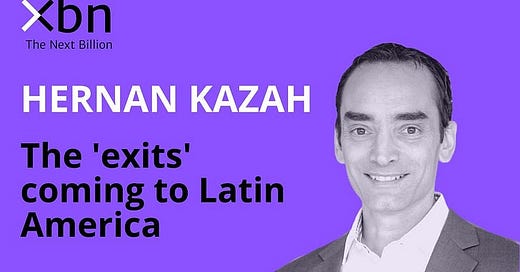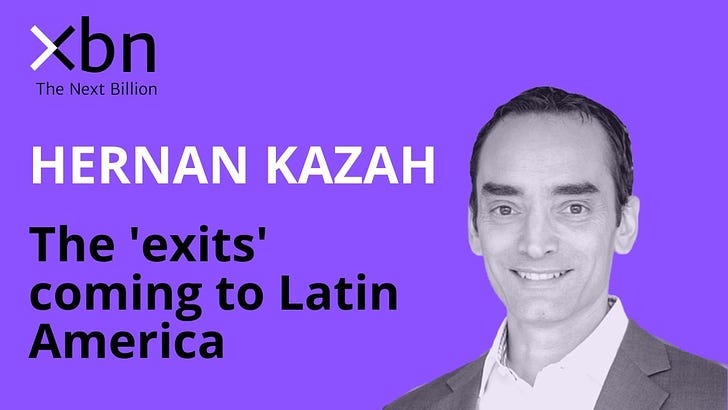👋 Hi there, Juan Gabriel here, and this is where I write about the ideas, companies and people redefining the future for the next billion internet users. Make sure to stay up to date by clicking this button to subscribe 👇🏻. One article every two weeks.
💸 The Exits are Coming
This week I’m thrilled to kick off a series focused on the massive ‘exits’ that are coming to emerging markets.
We’ll start with Latin America, but don’t worry I’ll cover your region in future pieces 🌍. It just happens that I recently interviewed Hernán Kazah, co-founder of Mercado Libre (eBay/Amazon in Latin America). Hernán is now co-founder and Managing Partner of KASZEK, one of the region’s premier VC funds. As cofounder of Latin America’s most valuable company—$MELI at ~$80 bn—and now an investor at the region’s most promising start ups, Hernán has a keen insight into the region’s transformation.
Watch or listen to the full interview by clicking on the links above, and don’t forget to subscribe & share!
🥏 Arriving, but not Arrived
According to news outlets, Latin America “has arrived” among global VCs. Just last week a16z published a piece on the region’s fintech boom and even republished it in Spanish. The numbers back this up, VC investment in the region increased +30x from $143M in 2011 to $4.6 bn in 2019—before a small Covid-related dip in 2020.
The region has come a long way and there are several household names that have emerged from this inflow. Though they do everything from banking, delivery, e-commerce and more, few of these start-ups are profitable and even fewer are publicly traded. For Latin America to truly “arrive” these investments must prove they can command commensurate returns to investors and value to the ecosystem: ‘exits’. Exits of private capital in in Latin America have been growing, but they fall short of the numbers necessary to make VC viable in the region. In 2018, the combined value of private capital exits in the region (including Private Equity) amounted to $4.8 billion while the VC inflows that same year totaled ~$2 billion. The inflows (investments) just don’t seem to match the value created (exits) at this point.
In fact, despite a few other notable exits, the benchmark for successful exits in the region is still Mercado Libre, which Kazah co-founded and oversaw as COO, and later CFO after it went public in 2007. Mercado Libre was not an instant success, it took time. $MELI went public at $830M (not even a unicorn 🦄) and it took over a decade to reach a $10 bn valuation. In earlier days, the cofounders aspired not to go public but to get acquired by eBay or Amazon. And, until recently, top talent sought employment in traditional corporate roles and consultancies, and investors were looking at opportunities in other corporates, not puny upstarts. This myopia and struggle, is also what helped push Kazah into investing.
“The fact that I ended moving to the investment sector was something that was cooking slowly during my tenure throughout the Mercado Libre experience” explains Kazah. While Mercado Libre had several investors and advisors, few of them had entrepreneurial or tech experience. Hernán and Nicolás Szekasy —his cofounder and newly-minted Midas Lister—learned “that there were lots of opportunities to create value in Latin America through technology […] but we didn't have that many entrepreneurs and more importantly we didn't have venture capitalists, the VCs that we have in Silicon Valley.” To rise to the challenge, Kazah and Szekasy launched KASZEK with an inaugural $95M fund to bet on the region’s entrepreneurs.
💹 Primed and Ready
The defining factor is that the inflow of funds has created a robust tech and entrepreneurial ecosystem allowing remarkable companies to come into existence. Ecommerce on Mercado Libre. Ride hailing (and more) on Rappi. Digital banking on Nubank. Grocery deliveries on Cornershop. Identity management on Auth0. Bio-engineered plant-based to meat from NotCo. Games on Wildlife Studios. Financial APIs on Belvo. Health & Wellbeing on Gympass. Buying and selling homes on LaHaus.
Altogether, this means a lot of companies and potential. Leading Mexico-based ALLVP fund has created a ‘Hundred Million Club’, but its just the tip of the iceberg.
Now, the expectation then is that these ‘exits’ will come.
“What's happening in Latin America is that we are having a great evolution, not from one day to the next but rather sequentially. At the beginning when we became VCs the typical question was: are you going to find enough start ups to invest your capital? And then once we demonstrated that, the question was: but then, are you going to find investors to provide follow-on capital for your companies?” Kazah explains. “And today, the question we are getting is what you are asking, its about exits. I think as happened with the first two questions, answers will come very naturally.”
That’s excellent news for the LATAM tech ecosystem. More successful exits will validate existing investments and draw in even more funds and ideas to the sector. Its also good for start-ups to attract top talent for the region, drawing away from corporates and even importing talent globally, where appropriate. More importantly, these new industries are more likely to sustain Latin America’s long-term development than exporting agricultural commodities or raw materials, which have led to measurable but disappointing increases in quality of life. While some claim that the tech ecosystem in the United States is bubble-like with VC-subsidized firms that will soon perish, that’s unlikely to be the case for Latin America for some time. Venture Capital penetration is still in its infancy, but the potential for massive returns and value is primed and pumped. It has already begun:
“For a while $MELI was the only publicly traded company and everybody thought that next year we'll have more and that did not happen, and the following year, and it didn't happen either. Now it's happening. You haven not only $MELI, but PagSeguro, Stone, XP.”
🚀 The Future Validates
So, back to the future. What can we expect from the coming exits in Latin America? Kazah and KASZEK will celebrate a decade of investing in June 2021. By then, we may not witness the massive exits commensurate to the companies entrepreneurs have built. Truly momentous exits —equivalent almost to a year’s worth of exits at current levels (+$11 bn)— may come later in 2021 or 2022. I predict that in the next 12 months we’ll see LATAM’s first +$10bn exit. Nubank, one of KASZEK’s portfolio companies is currently valued at $25bn and might just set a new benchmark for the region if it —as rumored—chooses to go public. The entrepreneurs and investors behind these companies must consider the following options:
A. Strategic Acquisitions. Often by large incumbent players in the domestic (such as OLX acquiring Grupo ZAP) or international players seeking better technologies and local expertise (Uber acquiring Cornershop, Okta acquires Auth0)
B. Going Public Domestically. Looking for local liquidity in core markets, where Brazil stands out. According to Kazah “the local stock market in Brazil has become quite open for smaller tech stories.”
C. Going Public Internationally. Diving deep into global investors. Kazah describes “What we learned with MELI and confirmed is that the US market is deep and has lots of great investors that understand technology and the sequences to evolve and progress with any business […] today I have not seen a better market than the US market for Latin American companies.”
It is Option C that excites Kazah the most. When investing “we dream [with the entrepreneur] of that image of ringing the bell after a successful IPO”, he remarks before elaborating “but, at the end of the day, the founders make the decision.” Having gone through this himself, he seems keen to understand and support the founders he backs. One way or another, the exits are coming to Latin America!
💡 Nifty Nuggets from KASZEK’s Hernan Kazah
Make sure to watch or listen to the entire interview with Hernán and subscribe for more content. Here are a few of Kazah’s quotes from the remainder of the interview.
“Copycats” are Pioneers
“When we started investing in 2011, most of the businesses were "copycats." Some people look down on that term, we don't do that at all. It takes lots of challenges to build a business successfully and adapt it to the region.
In a way Mercado Libre was that, we looked at Amazon and eBay and were inspired by that. But today, if we look at Mercado Libre, it is a company of its own. It has innovated in many areas way beyond where eBay has innovated or Amazon is.”
From Latin America for the World
“In the first portfolio we used to see "this is the X of Latin America" and now we see many businesses that are created because entrepreneurs were frustrated wit ha particular problem they experienced in Latin America and they created the solution to solve that problem.
Sometimes that is a problem that applies only for Latin America and just by solving it you can create a very large company and sometimes they realize 'Oh look, this is also a problem that is also relevant to Europe'. Sometimes, we start to see companies in Germany or the UK saying 'I want to build the Nubank of the UK or Germany'. Clearly, the whole ecosystem has evolved.”
Asia x Latin America
“At the beginning the global companies were American and European companies, expanding into Latin America and there was no experience with Asia. Asia is a continent that has transformed itself over the last 20-30 years. They were a bit slow because they had so much to take care of in their local markets, but its also happening [Asian players coming to Latin America].
We see that as well in our investor base. We used to have only US investors, and now we have Asian investors that believe in the future of Latin America, they are seeing some of the trends they saw in their markets and they believe that having experience that firsthand they can replicate it in Latin America”
Thanks for reading 🙌 Feedback? Please. Building something for the next billion? Please reach out: on Twitter or LinkedIn. If you haven’t yet, please subscribe and share!
Let me know your thoughts on this piece!











Share this post